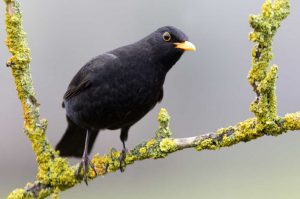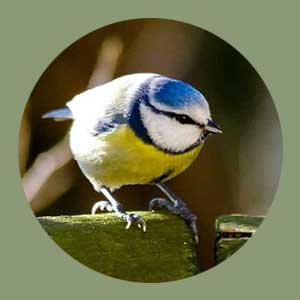I rarely look out of my window when there isn’t a blackbird hopping around the lawn looking for juicy earthworms. Most often, it is a solitary bird, but occasionally there are two.
I wonder, do blackbirds mate for life, and are they a couple foraging for food for their babies? Or are they just two random birds that think my garden looks rich pickings?

Many blackbirds mate for life, providing they have at least one successful brood. As many as 60% of nests might fail due to predation; this results in a minority of birds moving on to seek a new partner.
Even lasting partnerships have their ups and downs – some male blackbirds cheat on their mate and raise a second family. In his defence, he will feed and care for any fledglings that he fathers, to leave the mother time to prepare for the next brood.
Table of Contents
How Blackbirds Meet Their Mate
Male blackbirds are very hardworking and seek to establish a territory before they are a year old. They usually manage to hold onto it for their whole life, often with the help of their mate. Although the boundaries of the territory loosen during moulting and fledging times, the owners are never too far away to protect it until it is time to strengthen and rebuild.
To help him choose his perfect partner, the male performs a courtship routine. I’ve never been lucky enough to witness one, but it sounds fun!
He begins by running back and forth along a branch bobbing his head up and down with his beak wide open. Then he starts a song, and although blackbirds are renowned for their beautiful call, this sound is far from that. It is a strangled, low sound from the pits of his stomach.
Meanwhile, the female sits motionless and unimpressed. He has no idea if she is interested or not until she raises her head and tail to allow copulation.
Do Blackbirds Always Stay Together for Life
Most birds are monogamous, around 90% of the world’s avian population. Blackbirds take this one stage further; if the conditions permit, they stay together for all of their lives; an average of 3-4 years.
Some factors will cause them to seek new mates-
- If a brood fails, most likely due to predation, the couple might split and seek new mates. Their nests are low to the ground and not shielded, making them a target for cats and larger birds. Up to 60% of eggs and nestlings are lost this way.
- If one bird dies, the other will move on in the hope of raising a family.
What Keeps Blackbirds Together for Life
As a species, blackbirds haven’t got wanderlust; most stay close to their birth site.
They are good at co-parenting; both parents feed the young, even 3-weeks after they have fledged the nest.
The male blackbird continues to look after the young to free up the female to attempt a second and sometimes third brood.
If there is sufficient food available, the birds work together to defend the territory, even through winter.
Their biggest threat comes from other blackbirds, but it is usually over after a few bowed heads and a squabble!
Even bigger fights don’t last long; the intruder usually fails to get to the nesting site and flees. Strangely, the female is the aggressor during spring – although she gets into scraps less frequently than her mate, she is the most fearsome.
Final thoughts
There are more than 6-million breeding pairs of blackbirds in the UK, with the most successful residing in parks and gardens.
They are industrious birds that adapt well to their surroundings, just another reason that blackbirds mate for life.
Listen to their happy song, most prevalent after rain. They are letting you know that they are thankful for the worms in your garden, and the happy couple plunders the soil and lawn to feed their young.

Thanks for such wonderful comments. I really love the blackbird’s song. We always seem to have a one or two in our garden or in trees in nearby gardens.
I find they sing at around sunset here in Melbourne, Australia. It’s such a beautiful song and really does enhance our environment. It’s quite uplifting for the human spirit.
We had a pair in our own garden for a long time. They’d usually feed together daily. But the female has been missing now for well over a year. It led us to think that perhaps they mated for life.
Thanks again for your wonderful article.
George